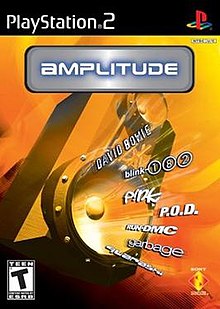| Amplitude | |
|---|---|
 | |
| Developer(s) | Harmonix |
| Publisher(s) | Sony Computer Entertainment |
| Director(s) | Greg LoPiccolo |
| Producer(s) | Tracy Rosenthal-Newsom Daniel Sussman |
| Programmer(s) | Eran Egozy Eric Malafeew |
| Platform(s) | PlayStation 2 |
| Release | November 4, 2003 (P.O.D. Special Edition)[4] |
| Genre(s) | Rhythm |
| Mode(s) | Single-player, multiplayer |
Amplitude is a 2003 rhythm game developed by Harmonix and published by Sony Computer Entertainment for the PlayStation 2. It is the sequel to Frequency (2001). The game was released in 2003 for North America on March 25 and for Europe on September 26.
In Amplitude the player controls a beat blaster ship across a lane of six tracks, each track representing a musical instrument and containing note gems that the player shoots at in time with the music. The player earns points for accurate playing and increases their scoring multiplier by playing a series of flawless sequences; the player loses energy by missing too many notes and can end the song prematurely if they run out of energy. Compared to the original Frequency which used more electronica and trance music, Amplitude included additional pop rock songs in its soundtrack.
The game was met with a critical applause and a decent financial success, elevating Harmonix into a major studio in the development of music games. In 2014, Harmonix successfully offered a Kickstarter campaign to raise over $840,000 in funds to build a new Amplitude game for PlayStation 3 and 4 consoles; the reboot was released in January 2016.
- ^ Bramwell, Tom (September 26, 2003). "What's New?". Eurogamer. Gamer Network. Archived from the original on September 22, 2021. Retrieved May 21, 2024.
- ^ "Sony Computer Entertainment America's Amplitude Challenges Music Fans to Test Their DJ Skills at Winter Music Conference". Sony. March 19, 2003. Archived from the original on April 5, 2023. Retrieved May 21, 2024.
- ^ Torres, Ricardo (February 24, 2003). "Amplitude Updated Preview". GameSpot. Fandom. Archived from the original on March 7, 2005. Retrieved May 21, 2024.
- ^ Cite error: The named reference
P.O.D.was invoked but never defined (see the help page).